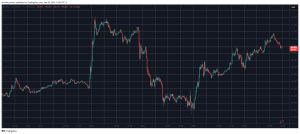
The report is called “Fear and favouring of digital currency” and aims to study the sentiment of different realities that make up the economic system, with a view towards the future cashless society.
The role of credit cards and payment apps is considered in relation to the coming evolution of cryptocurrencies and CBDCs.
The future cashless society will be powered by cryptocurrencies

The study was commissioned by Crypto.com and was written on the basis of two surveys conducted in January and February 2022. The first takes a sample of 3,000 consumers, while the second covers the perception of institutional figures. Of these, 150 institutional investors and corporate treasury managers were chosen.
The two surveys were mainly used to understand the attitudes of consumers and institutional figures towards cryptocurrencies.
They are not talking about digital assets in general, but more specifically how they could function as a potential payment method, permanently replacing cash.
This would fuel the transition process towards a cashless society that aims to be not only more efficient, but also more transparent and sustainable.
How is the sample composed?
The data from the 3000 consumers interviewed cover the analysis carried out in the first part of the report. Half of these are from developed economies (US, UK, France, South Korea, Australia and Singapore), while the other half are from developing countries (Brazil, Turkey, Vietnam, South Africa and the Philippines).
Approximately 7 out of 10 of the respondents are in the 18-41 age group, with the remainder over 42. 53% of the sample is male and 3 out of 4 of the total have a university or professional degree.
Results and conclusions of the report
Firstly, it is important to note that the report shows that 3 out of 4 consumers expect their respective countries to become completely cashless within the next 5 years.
The survey results show that all those who believe in this transition for their country also believe that public institutions play a key role in the success of this operation.
This line of thinking continues to grow, with 49% agreeing, up from 27% in 2021.
The desire to see the emergence of CBDCs is growing, with both sides agreeing that the current legislative framework is the biggest barrier to innovation.
65% of institutional figures believe that CBDCs will replace any physical form of payment within their countries.
Strong growth in demand for digital currencies is expected, especially with the continued expansion of the metaverse and NFTs, which are increasingly interconnected with real life.
Illustrating the future movement towards new assets, with a focus on NFTs, Mr Mitchell states that:
“We accommodate units of value on our platform and allow for the conversions of these units of value to be made whether it is digital first currency or anything that you can ascribe a value to that we can hold, convert and allow”.
To view the full report, please visit the dedicated webpage.
The post Cryptocurrencies as a means to a cashless society appeared first on The Cryptonomist.





















